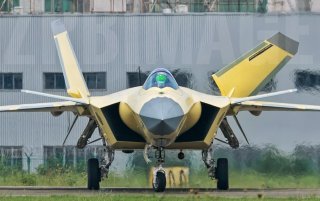Is China Trying to Start a War with Taiwan?
In addition to the flights by Chinese combat aircraft, the People's Liberation Army Navy (PLAN) has deployed warships including the aircraft carrier Liaoning near Taiwan's east coast.
Beijing has been increasingly rattling sabers--and perhaps trying to provoke a crisis.
Earlier this week, China sent twenty-five warplanes into Taiwan's air defense identification zone (ADIZ), the largest incursion of its airspace to date.
There has been no comment from Beijing, which has increased aerial sorties near the ADIZ in the past months. Since last September there have been regular incursions into Taiwanese airspace.
The ADIZ is a self-declared area of airspace that surrounds a country or territory, including both land and water, in which the identification and control of civil aircraft is performed in the interest of national security. However, the concept of ADIZ, which was established during the Korean War, is not defined in any international treaty and is therefore not regulated by any international body. Such zones generally only cover undisputed territory and are not the same as flight information regions (FIRs), which are used to manage air traffic. However, even as there is no basis in international law, breaching another territory's zone is seen as an act of aggression.
In the case of Taiwan, its ADIZ covers most of the Taiwan Strait, part of the East China Sea, and the adjacent airspace. It also covers Taiwan's exclusive economic zone (EEZ).
Beijing established its own ADIZ over the East China Sea in 2013, which covered a large swath of airspace including over small islands that are the subject of territorial disputes with Japan and Taiwan. Senior officials from the United States and East Asian countries criticized China's action and raised concerns that the new ADIZ could escalate tensions surrounding the territorial dispute and even lead to conflict. Last year, it was also reported that China was planning to create a similar ADIZ in the South China Sea.
According to multiple sources, during a recent incursion into the ADIZ, the aircraft included eighteen fighters including fourteen J-16 fighter jets and four J-10 fighter jets; along with four H-6K heavy bombers, two anti-submarine warfare planes and an airborne early warning and control plane. The bombers are capable of carrying nuclear weapons. It was the largest daily incursion since Taipei began regularly reporting Chinese Air Force activities near the ADIZ last year.
Taiwan responded by scrambling its own combat aircraft and alerting missile defense systems. It also issued radio warnings to the Chinese aircraft that they had entered the southwestern corner of the island's self-declared ADIZ.
The flight came one day after United States Secretary of State Antony Blinken said that Washington was concerned about China's aggressive stance against Taiwan. He had warned it would be a "serious mistake" for any power to try to change the status quo in the Western Pacific.
However, Beijing has claimed Taiwan as its territory, even as the democratic island nation of almost twenty-four million people has been self-governed for more than seven decades. Chinese President Xi Jinping has made it clear that his government will never allow Taiwan to become formally independent and has refused to rule out the use of force to reunite the island with the mainland.
In addition to the flights by Chinese combat aircraft, the People's Liberation Army Navy (PLAN) has deployed warships including the aircraft carrier Liaoning near Taiwan's east coast.
Peter Suciu is a Michigan-based writer who has contributed to more than four dozen magazines, newspapers and websites. He regularly writes about military small arms, and is the author of several books on military headgear including A Gallery of Military Headdress, which is available on Amazon.com.

